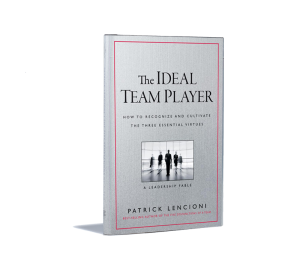The Ideal Team Player by Patrick Lencioni was the first book I picked up for Christmas break. There is just something about sitting by the fireplace and the Christmas tree that entices me to want to read for hours! I was intrigued by this book for two reasons. First, I long to be the ideal team player. Whether it is in my family, in my career, or anywhere in life that the Lord leads me…I want to bring great value to any team that I am blessed to be a part of. Secondly, I believe that the Lord has given me the gifts and desire to lead a great team. My goal in reading this book was to identify any blindspots in my own life as well as to refine my definition of the ideal team player.
I’ve long appreciated Pat Lencioni’s books and the way that he uses fables to get his point across. Here is a link to several other reviews I’ve written on Lencioni books. I’ve found his books to be both helpful and practical. I really can’t think of an area of life that his principles wouldn’t apply. I highlighted several things while reading and have posted those notes below…
- The ability to work effectively with others, to add value within the dynamics of a group endeavor, is more curtail in today’s fluid world than it has ever been.
- For organizations seriously committed to making teamwork a cultural reality, I’m convinced that “the right people” are the ones who have the three virtues in common—humility, hunger, and people smarts.
- Humility is the single greatest and most indispensable attribute of being a team player.
- “Humility isn’t thinking less of yourself, but thinking of yourself less.” CS Lewis
- Hungry people almost never have to be pushed by a manager to work harder because they are self-motivated and diligent.
- Smart simply refers to a person’s common sense about people.
- What makes humble, hungry, and smart powerful and unique is not the individual attributes themselves, but rather the required combination of all three.
- Many people will try to get a job even if they don’t fit the company’s stated values, but very few will do so if they know that they’re going to be held accountable, day in and day out, for behavior the violates the values.
-
We are looking for ideal team players, not adequate ones.
-
Leaders who want to create a culture of humility, hunger, and people smarts in their organization should be constantly on the lookout for any displays of those virtues. And when they see those displays, they should hold them up as examples for everyone to see.
- Tell me about the most important accomplishments of your career
- What was the most embarrassing moment in your career? Or the biggest failure?
- How did you handle that embarrassment or failure?
- What is your greatest weakness?
- How do you handle apologies, either giving or accepting them?
- Tell me about someone who is better than you in an area that really matters to you
- What is the hardest you’ve ever worked on something in your life?
- What do you like to do when you’re not working?
- Did you work hard when you were a teenager?
- What kinds of hours do you usually work?
- How would you describe your personality?
- What do you do that others in your personal life might find annoying?
- What kind of people annoy you the most, and how do you deal with them?
- Would your former colleagues describe you as an empathetic person? or Can you give me an example of how you’ve demonstrated empathy to a teammate?


